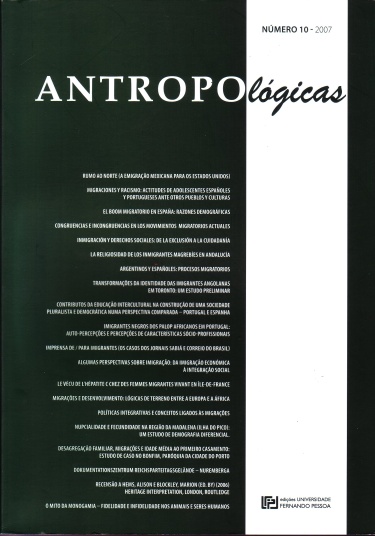Contributos da educação intercultural na construção de uma sociedade pluralista e democrática numa perspectiva comparada – Portugal e Espanha
Abstract
At the moment we live, the problematic of the intercultural relations presents itself to us in a particularly intense way. The European project develops and deepens, the phenomena of nationalisms spreads to all Europe, becoming too much evident all the national idiosyncrasies and cultural multiplicities. At the same time we verified phenomena’s of population dislocation in large scale and particularly in Portugal and Spain, traditional emigration coutries, in these last years we are confronted with massive waves of immigrants from African and sud-american countries, as well as from the eastern Europe.
The immigration in Iberian Peninsula is presently an infightable reality, specialy if we consider the quantity and the diversity of the immigrant origins.
The live conditions improvement after the first years of immigration and the family reagrupment lead to the rise in the number of immigrant children in the educative Portuguese and Spanish sistema. This fact by itself can explain the rising need to crate spaces in school for intercultural education, since it comes as a privilege place of socialization and acquisition of the own culture and simultaneously as a way of communicative interaction with the “other” culture.
In this context we will try to make an analisis of the situation in which the intercultural education in Spain and Portugal, enrooting it in the education towards citizenship, this way trying to encounter common spots of acting and simultaneously learn with the experiences performed in both countries, contributing to the construction of a real multicultural society.
Downloads
Issue
Section
License
Copyright Notice
Authors who publish in this journal comply to the following terms:
- Authors retain copyright and grant the magazine right of first publication, with the work simultaneously licensed under a Creative Commons Attribution license that allows the sharing of work and recognition of authorship and first publication in this journal.
- Authors are authorized to take additional contracts separately for non-exclusive distribution of the work published in this journal version (ex.: publish in an institutional repository or as a chapter of a book), with recognition of authorship and first publication in this journal.
- Authors are allowed and encouraged to publish and distribute their work online (e.g., in institutional repositories or on their personal page) at any point before or during the editorial process, as it can generate fruitful changes, as well as increase the impact and citation of the published work (see The effect of open access). [link to http: opcit.eprints.orgoacitation-biblio.html]


